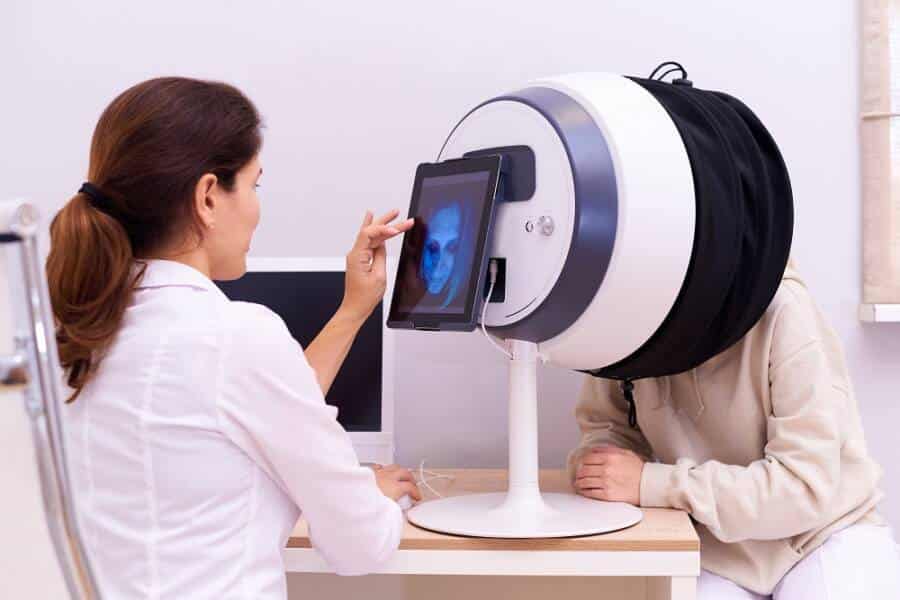Watch out for the signs that may indicate multiple sclerosis:
Dizziness, fatigue, muscle weakness, and unusual discomfort or tingling sensations are some of the early symptoms of multiple sclerosis. For a better understanding, these early symptoms are caused by damage to the fatty layer that covers the myelin sheath that surrounds your central nervous system’s nerve fibers.
Doctors say that these symptoms differ from one person to another, but there is one that may affect a larger number of patients, called the “MS hug,” which resembles a squeezing feeling that’s pretty bad around the torso. This is among the first signs that may indicate multiple sclerosis.
That being said, in the following lines, with the help of the best doctors in the area, we will talk about the warning signs that may indicate multiple sclerosis.

Inflammation of one of your two optic nerves
Medically known as optic neuritis is a typical MS initial symptom. Your brain receives information from your optic nerve about what your eye sees. Damage to the myelin sheath surrounding the optic nerve disrupts signals associated with vision.
Optic neuritis commonly manifests as color blindness, particularly in red and green, blurred vision, dim vision, especially in the back of the eye socket, faint pain when moving the eyes, and blurry vision when the lights are off or at night.
According to a recent study, around 70% of people who experienced optic neuritis as a first symptom, two years later, were diagnosed with multiple sclerosis.
Vision problems
In addition to optic neuritis, diplopia—also referred to as double vision—is another common visual issue associated with multiple sclerosis. It is characterized by uncoordinated eye movements that cause you to see double. Damage to the nerves that regulate your eye muscles causes this symptom.
The other major visual problem is nystagmus, also referred to as “dancing eye syndrome,” which is typically brought on by injury to the part of the brainstem responsible for controlling eye movements.
Muscle spasms
Among the most common signs that may indicate multiple sclerosis is muscle spasm. MS patients frequently experience muscle spasms, which are mostly brought on by myelin damage in the nerves that connect or innervate your muscles.
Your muscles are unable to relax correctly due to a disruption in nerve signals. In the affected muscle or muscles, this results in stiffness, tightness, cramping, or a heavy feeling even if all you did was to sit on the couch.
Although they can happen anywhere in the body, spasms most frequently affect the legs. Additionally, muscle spasms are frequently asymmetrical, occurring more frequently on one side of the body than the other.
Balance and coordination problems
This symptom isn’t always associated with this particular illness; however, it’s one of the signs that may indicate multiple sclerosis. Dizziness, instability, and poor coordination make basic tasks like walking, writing, and even eating much more difficult than they actually are.
Being tired all the time
Are you feeling more tired than usual even if you’re sleeping 7-8 hours per night? This might be one of the signs that may indicate multiple sclerosis. Often referred to as “having the flu,” multiple sclerosis fatigue is made worse by heat and humidity and is not minimized by sleep.
In addition to the illness itself, other factors such as medications, sleep disorders, or depression may also contribute to the overwhelming fatigue and depletion of energy that characterize MS fatigue. Damage to the CNS’s nerve fibers, which normally regulate muscle movement, is another common cause of weakness. So in case you are taking certain medications and you’re feeling extra tired, it may be best to talk to your doctor and request some blood tests.
Unfortunately, a lot of people overlook this because they don’t think it’s “a big deal,” but because MS is a difficult-to-diagnose condition, 75% of those who are later confirmed with it experience chronic fatigue.
Depression
Depression is characterized by persistent melancholy and a loss of interest in once-enjoyed activities. Depression in multiple sclerosis can strike early or late in the course of the illness. According to a 2024 study of over 5,633 MS patients, one in four of them suffered from depression. This could be because the illness affects the parts of the brain that control emotions. Additionally, interferon medications and corticosteroids used to treat MS relapses may have adverse effects that lead to depression.
Additionally, a person with multiple sclerosis who has been recently diagnosed may encounter a variety of challenges throughout their daily lives, which can quickly cause emotional shifts.

Bladder dysfunction
This is a common symptom associated with multiple sclerosis, which affects the majority of patients earlier or later on in the course of the disease. This usually starts with the urge to urinate right away, but when you go to the bathroom, you can’t actually do it. The frequency of nocturia is becoming very annoying, and in some cases, if you don’t go to the bathroom soon, you might end up having an involuntary loss of urine.
Furthermore, besides frequent urination, patients with multiple sclerosis may also experience constipation no matter how much fiber they eat during the day. Other symptoms of multiple sclerosis, such as pain, muscle spasms, bladder dysfunction, and difficulty walking, can be made worse by constipation. Additionally, it may contribute to a loss of bowel control, known as fecal incontinence.
Who is more prone to develop multiple sclerosis?
MS usually strikes between the ages of 20 and 40, and it is more common in women than in men. Although it is more prevalent in white people, it can affect people of all races and ethnicities. Vitamin D deficiency, autoimmune disorders, a history of smoking, and certain family members with this illness are examples of factors that increase risk.
Can you have multiple sclerosis but you aren’t aware of it?
The answer is definitely yes. Indeed, there may be an initial (or “very early”) phase of multiple sclerosis, according to research. Numerous vague symptoms, such as headache, pain, depression, and exhaustion, are present during this stage. These symptoms may appear years before a diagnosis of multiple sclerosis.
How much time do I have if I am diagnosed with multiple sclerosis?
First of all, no matter how hard and challenging it will be to live with this chronic disease, never give up on yourself because there is no specific life expectancy. Some people may live full life spans while having to deal with MS issues, while others may be a few years shorter.
Things like proper treatment, your overall health, how your body reacts to the treatment, and your genetics will influence life expectancy. If you notice one or two symptoms in yourself, it’s a good idea to schedule an appointment with your doctor as soon as you can. Getting diagnosed and treated for MS early on can lead to better long-term results!
Does this article seem a little bit difficult to understand, and do you feel the need to compensate with extra information? The book Multiple Sclerosis for Dummies: 2nd Edition may help you understand this illness better, how the symptoms are developing (and they can be different from one person to another), and most importantly, how you can navigate life smoothly having this illness. Even if you were just diagnosed with multiple sclerosis or you’re suspecting you have it, that doesn’t mean your life ends there.
You may also be interested in reading: 9 Surprising Ways to Boost Your Immune System Naturally.





